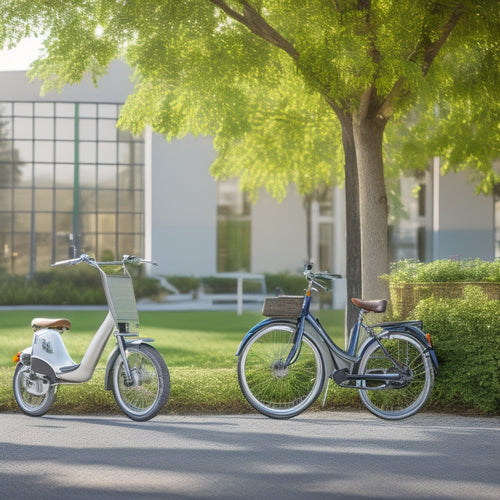
Reducing Carbon Footprint With Electric Bike Commuting
Share
You can greatly reduce your carbon footprint by switching to electric bike commuting, a sustainable transportation mode that offers a zero-emission, energy-efficient, and cost-effective alternative to fossil fuel-based vehicles. By choosing e-bikes, you'll eliminate personal carbon emissions, reduce air pollutants, and contribute to eco-friendly infrastructure development. With e-bikes, you'll also decrease greenhouse gas emissions, energy consumption, and fossil fuel dependency, while improving air quality and your own physical and mental well-being. As you explore the benefits of electric bike commuting, you'll discover a holistic approach to sustainable urban mobility that can transform your daily life and the environment.
Key Takeaways
• Electric bikes eliminate personal carbon emissions, reducing greenhouse gas emissions and air pollutants like particulate matter.
• E-bikes offer a carbon-neutral commute, with 95% energy conversion rate, losing only 5% as heat, and saving up to 150 kg of CO2 emissions per year.
• Switching to electric bikes reduces reliance on fossil fuels, contributing to a shift towards sustainable urban mobility and eco-friendly infrastructure development.
• Electric bike commuting reduces air pollution, benefiting urban areas, and supports the growth of sustainable transportation systems with green spaces and bike-friendly roads.
• By choosing electric bikes, individuals can save up to 75% on fuel costs compared to gas-powered vehicles, making it a cost-effective and environmentally friendly option.
Zero Emission Daily Commutes
By switching to an electric bike for your daily commute, you'll eliminate a significant source of personal carbon emissions, contributing to a cleaner environment. This is especially important during Rush Hour, when congested roads and idling vehicles create a perfect storm of air pollution. By ditching your gas-guzzler, you'll reduce your carbon footprint and help mitigate the negative impacts of Commute Culture on our planet.
As you pedal to work, you'll not only be doing your part for the environment, but you'll also be improving your physical and mental health. Electric bikes provide a low-impact workout, perfect for those who want to stay active without exerting themselves too much.
Additionally, the fresh air and exercise will leave you feeling invigorated and focused, ready to tackle the day ahead.
Lower Air Pollution Rates
As you trade in your fossil fuel-reliant vehicle for an electric bike, you'll contribute to a significant reduction in air pollutants like particulate matter, nitrogen oxides, and volatile organic compounds, which are known to exacerbate respiratory issues and other health problems.
By switching to electric bike commuting, you'll be doing your part to improve air quality, especially in urban areas where pollution tends to concentrate.
Forward-thinking urban planning strategies, such as designating Green Zones, can further amplify the benefits of electric bike commuting. These designated areas restrict or ban fossil fuel-based transportation, creating a healthier environment for residents and commuters alike.
As more people opt for electric bikes, cities can refine their urban planning to prioritize clean transportation, reducing air pollution rates and creating a better quality of life for everyone.
Carbon Neutral Transportation Mode
Your daily commute can be a carbon-neutral transportation mode when you swap your gas-guzzler for an electric bike, producing zero tailpipe emissions and reducing your carbon footprint to near zero. By choosing an e-bike, you're not only reducing your personal carbon footprint but also contributing to a more sustainable transportation system. This shift towards carbon-neutral transportation is essential in combating climate change.
| Mode of Transportation | Carbon Footprint |
|---|---|
| Gas-powered Car | 4.6 kg CO2e per mile |
| Electric Bike | 0 kg CO2e per mile |
| Public Transportation | 0.2 kg CO2e per mile |
In addition to reducing emissions, electric bikes also support green infrastructure development. As cities invest in bike-friendly roads and green spaces, they're creating a more sustainable urban environment. Moreover, carbon offsetting initiatives can help balance out any remaining emissions from e-bike production and charging. By embracing electric bike commuting, you're playing an important role in shaping a cleaner, healthier, and more sustainable transportation system.
Reduced Greenhouse Gas Emissions
When you opt for electric bike commuting, you'll notably reduce greenhouse gas emissions compared to traditional fossil fuel-based transportation methods.
You'll be producing minimal emissions per mile, leveraging the fuel efficiency advantage of electric bikes, and reaping the pollution reduction benefits that come with this eco-friendly mode of transportation.
Emissions Per Mile Comparison
By switching to an electric bike for your daily commute, you'll reduce your carbon footprint to a great extent, with e-bikes emitting a mere 1.4 grams of CO2 equivalent per mile, compared to 411 grams per mile for a gasoline-powered car. This significant reduction in emissions is an essential step towards a more sustainable future.
| Mode of Transportation | Emissions per Mile (grams CO2 equivalent) |
|---|---|
| Electric Bike | 1.4 |
| Gasoline-Powered Car | 411 |
| Hybrid Car | 174 |
| Bus | 125 |
| Motorcycle | 117 |
As governments and corporations continue to implement regulations and initiatives to reduce greenhouse gas emissions, adopting electric bike commuting can be a critical contribution to this effort. Government regulations, such as tax incentives for eco-friendly transportation, and corporate initiatives, like bike-to-work programs, can encourage individuals to make the switch. By choosing an electric bike for your daily commute, you'll not only reduce your carbon footprint but also contribute to a larger movement towards a more sustainable future.
Fuel Efficiency Advantage
Electric bikes boast a remarkable fuel efficiency advantage, with their electric motors achieving a staggering 1,000-2,000 miles per gallon equivalent, dwarfing the 30-40 miles per gallon of even the most fuel-efficient gasoline-powered cars. This means you'll be saving a significant amount on fuel costs, which can add up to substantial cost savings over time.
Here are just a few benefits you can expect from making the switch to an electric bike:
-
Reduced fuel expenses: With an electric bike, you'll be spending pennies on the dollar compared to driving a gas-powered vehicle.
-
Increased battery longevity: By reducing the load on your battery, you'll be able to extend its lifespan and reduce the need for frequent replacements.
-
Less frequent charging: With an electric bike, you'll be able to go longer between charges, making it a convenient and hassle-free option for your daily commute.
Pollution Reduction Benefits
You can greatly reduce your carbon footprint by commuting on an electric bike, which produces zero tailpipe emissions and minimizes greenhouse gas emissions throughout its entire lifecycle. This is especially important in urban areas, where air pollution is a significant concern. By choosing an e-bike, you're not only reducing your personal carbon footprint but also contributing to a cleaner, healthier environment for everyone.
| Emissions Comparison | E-Bike | Gas-Powered Vehicle |
|---|---|---|
| CO2 Emissions (g/km) | 2.5 | 120 |
| NOx Emissions (g/km) | 0.01 | 0.12 |
| Particulate Matter (g/km) | 0.001 | 0.01 |
| CH4 Emissions (g/km) | 0.05 | 0.25 |
| N2O Emissions (g/km) | 0.005 | 0.02 |
Government incentives and urban planning strategies can further encourage the adoption of e-bikes, creating a ripple effect that benefits the environment and public health. By promoting eco-friendly transportation options, cities can reduce their overall carbon footprint and create a more sustainable future.
Energy Efficiency Compared
As you consider electric bike commuting, you're likely wondering how it stacks up against traditional fossil fuel-based transportation when it comes to energy efficiency.
To get a clearer picture, let's compare the energy sources that power these modes of transportation, examining the methods used to generate electricity and the fuel efficiency of each.
Energy Source Comparison
Compared to traditional fossil fuel-powered vehicles, e-bikes boast an impressive energy efficiency, with some models converting up to 90% of the electrical energy from the grid to power the wheels. This is a significant improvement over traditional vehicles, which often have an energy efficiency of around 20-30%.
When you choose to commute on an e-bike, you're not only reducing your carbon footprint but also making the most of the energy you're using.
Here are some key benefits of e-bike energy efficiency:
-
Grid Parity: E-bikes can achieve grid parity, meaning they can generate electricity at a levelized cost equal to or less than the grid's electricity price. This makes them a cost-effective option for commuters.
-
Renewable Portfolio: With the increasing adoption of renewable energy sources, e-bikes can be powered by clean energy, further reducing their carbon footprint.
-
Energy Savings: By converting most of the electrical energy into power, e-bikes reduce energy waste, making them an attractive option for environmentally conscious commuters.
Electricity Generation Methods
When considering the energy efficiency of e-bikes, it's important to examine the methods used to generate the electricity that powers them. You might be wondering, what's the environmental impact of generating electricity for your daily commute? The answer lies in the mix of electricity generation methods used by your local grid.
In areas where renewable sources like solar, wind, and hydroelectric power dominate, the carbon footprint of e-bike commuting is greatly reduced. On the other hand, regions relying heavily on fossil fuels for electricity generation will have a higher carbon intensity.
Fortunately, the grid is becoming increasingly resilient, with a growing share of renewable sources in the energy mix. This shift is driven by policy incentives, declining renewable energy costs, and advancing technologies. As a result, the carbon intensity of the grid is decreasing over time, making e-bike commuting an increasingly attractive option for environmentally conscious commuters like yourself.
Fuel Efficiency Analysis
You'll want to crunch the numbers to understand how e-bikes stack up against their gas-guzzling counterparts when it comes to fuel efficiency. When considering the energy efficiency of e-bikes, it's essential to look at the bigger picture. Here's a breakdown of how e-bikes compare to traditional vehicles:
-
Energy Conversion: E-bikes boast an impressive 95% energy conversion rate, meaning only 5% of the energy is lost as heat. In contrast, gas-powered vehicles have a mere 20% energy conversion rate.
-
Fuel Economy: E-bikes can travel up to 100 miles on a single charge, equivalent to around 1,000 miles per gallon of gasoline. Traditional vehicles, on the other hand, average around 25 miles per gallon.
-
Cost Savings: With an e-bike, you can save up to 75% on fuel costs compared to driving a gas-powered vehicle. This translates to significant cost savings over time, which can be invested in infrastructure development and other sustainable initiatives.
Environmental Benefits of E-Bikes
By switching to e-bikes, daily commuters can greatly reduce their carbon footprint, with a single e-bike reportedly capable of saving up to 150 kg of CO2 emissions per year. This significant reduction in emissions has a profound impact on the environment, particularly in urban areas where air pollution is a major concern.
As you make the switch to e-bikes, you'll be contributing to a cleaner, healthier environment for yourself and your community. E-bikes also promote the development of eco-friendly infrastructure, supporting the growth of green spaces and sustainable transportation systems.
Sustainable Urban Mobility Solution
As you adopt e-bikes as a daily commuting solution, you're not only reducing your carbon footprint but also contributing to a broader shift towards sustainable urban mobility, where cities prioritize eco-friendly transportation systems and infrastructure. This shift is essential in creating a more livable and environmentally conscious urban environment.
Sustainable urban mobility involves a multifaceted approach that incorporates:
-
Urban planning: Designing cities with green spaces, bike-friendly roads, and efficient public transportation systems.
-
Bike infrastructure: Building dedicated bike lanes, bike-sharing systems, and secure parking facilities to encourage cycling.
-
Smart traffic management: Implementing intelligent traffic systems that optimize traffic flow, reduce congestion, and prioritize eco-friendly modes of transportation.
Fossil Fuel Dependency Reduction
As you switch to electric bike commuting, you're not only reducing your reliance on fossil fuels, but you're also contributing to a cleaner environment.
By leaving your gas-guzzling vehicle behind, you'll be lowering emissions today, which will have a significant impact on the air quality of tomorrow.
Lower Emissions Today
You can greatly reduce your reliance on fossil fuels by switching to electric bike commuting, which can lower emissions today. By making this change, you'll not only contribute to a cleaner environment, but also develop healthier personal habits.
As you pedal to work, you'll experience a shift in your commuter psychology, feeling more connected to your community and the environment.
Here are three ways electric bike commuting can make a difference:
-
Reduced air pollution: Electric bikes produce zero tailpipe emissions, minimizing the negative impact on air quality in your community.
-
Lower greenhouse gas emissions: By choosing electric power over fossil fuels, you'll reduce your carbon footprint and contribute to a cleaner environment.
-
Increased physical activity: Regular cycling can improve your overall health and wellbeing, reducing your reliance on fossil fuels and promoting a healthier lifestyle.
Reduce Gasoline Usage
By switching to electric bike commuting, you drastically cut down on gasoline usage, reducing your reliance on fossil fuels and decreasing the nation's overall fuel consumption. This significant reduction in fuel consumption translates to a more sustainable transportation system, contributing to a cleaner environment.
| Fuel Economy | Gasoline-Powered Commuting | Electric Bike Commuting |
|---|---|---|
| Fuel Consumption | 1 gallon per 25 miles | 0 gallons per 25 miles |
| Road Congestion | 1 car per 1 person | 1 bike per 1 person |
| Air Pollution | High emissions | Zero emissions |
| Energy Efficiency | 20-30% efficient | 90-95% efficient |
Cleaner Air Tomorrow
Reducing fossil fuel dependency is the key to accessing a cleaner air tomorrow, where the air is fresh, and the environment is thriving. By switching to electric bike commuting, you're not only reducing your carbon footprint but also contributing to a healthier environment. Urban planning plays an essential role in promoting cleaner air, and as you opt for eco-friendly transportation, you're influencing a positive change.
Here are three ways electric bike commuting improves air quality:
-
Reduced Particulate Matter: Electric bikes produce zero emissions, reducing the amount of particulate matter in the air, which is a significant contributor to respiratory problems.
-
Lower Nitrogen Oxide Levels: By reducing the number of gasoline-powered vehicles on the road, you're decreasing nitrogen oxide emissions, a primary cause of smog and air pollution.
-
Healthier Ozone Levels: With fewer fossil fuels being burned, ozone-depleting pollutants decrease, allowing the atmosphere to replenish and maintain a healthier ozone layer.
As you commute on your electric bike, you're actively contributing to a cleaner air tomorrow. By choosing sustainable transportation, you're supporting a healthier environment and paving the way for a brighter future.
Healthier Air Quality Guarantee
Electric bike commuting greatly reduces the amount of air pollutants and greenhouse gases emitted into the atmosphere, directly contributing to a healthier air quality guarantee. You'll be breathing easier, literally, as the air you inhale will be cleaner and fresher. By choosing electric bike commuting, you're taking a significant step towards improving your respiratory health. Your lungs will thank you, as the reduced air pollution means fewer toxic particles and gases are entering your body. It's a fresh start for your lungs, and your overall well-being.
Improved lungs mean a better quality of life, and electric bike commuting is a significant contributor to this goal. You'll experience a noticeable difference in your daily life, from increased energy levels to reduced respiratory issues. The cleaner air you breathe will also boost your immune system, making you less prone to illnesses.
As you ride your electric bike to work, you'll be enjoying the benefits of a healthier you, while also doing your part to reduce the carbon footprint. It's a win-win situation, and you're at the helm of this positive change.
Eco-Friendly Commuting Alternative
How does swapping your car keys for an electric bike's handlebars transform your daily commute into an eco-friendly adventure?
By choosing to commute on an electric bike, you're not only reducing your carbon footprint but also contributing to a more sustainable urban landscape. As you pedal through the city, you're supporting community engagement and urban planning initiatives that prioritize green spaces and clean air.
Here are just a few ways you're making a positive impact:
-
Reduced air pollution: By leaving your car behind, you're decreasing the amount of emissions released into the atmosphere, resulting in healthier air quality for your community.
-
Increased community engagement: Electric bike commuting encourages a sense of community, as riders often share routes and tips, fostering a sense of camaraderie and shared responsibility for the environment.
-
Influencing urban planning: As more people opt for eco-friendly commuting methods, urban planners take note, incorporating bike-friendly infrastructure and green spaces into city designs, ultimately shaping a more sustainable urban future.
Frequently Asked Questions
How Far Can I Commute on a Single E-Bike Battery Charge?
You're wondering how far you can commute on a single e-bike battery charge? It depends on your commute distance, route planning, and power-saving habits. Expect 20-60 miles on a single charge, but range anxiety can be minimized with efficient battery life management.
Are E-Bikes Suitable for People With Physical Disabilities?
You'll find e-bikes can be suitable for people with physical disabilities, offering accessible routes and disability benefits, such as increased mobility and independence, while also providing a fun, low-impact exercise option.
Can I Use My E-Bike in Rainy or Snowy Weather Conditions?
You can confidently ride your e-bike in rainy or snowy weather with the right gear - waterproof panniers, snow tires, rainy reflectors, and winter accessories like fenders with a clever design to keep you dry and visible.
Do E-Bikes Require Regular Maintenance Like Traditional Bicycles?
'You'll be relieved to know that e-bikes require minimal upkeep, but don't skip regular chain cleaning and brake adjustments to guarantee a smooth, safe ride - it's a small price for the freedom they bring!'
Are E-Bikes More Expensive Than Traditional Bicycles or Cars?
You'll find that e-bikes vary in price, with some costing as much as cars, while others are comparable to high-end traditional bicycles; the cost comparison depends on factors like brand, quality, and features, making price variability a key consideration.
Related Posts
-

Why Opt for These Affordable E-Scooter Alternatives?
You're tired of overspending on transportation and harming the environment, which is why you're considering affordabl...
-

What Are the Best Eco-Friendly Rides for Campus?
As you navigate your college campus, you have a wide range of eco-friendly ride options to choose from, including bic...
-

Why Are Online Prices for Panels So Low?
When you buy panels online, you're often taking advantage of a combination of factors that drive prices lower. You're...


